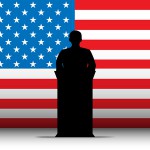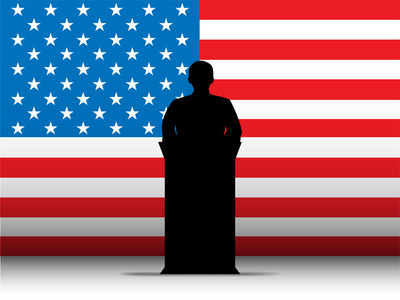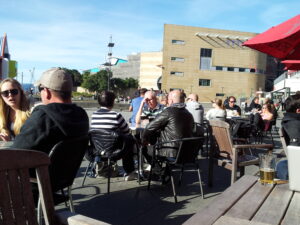 We were checking out at the natural foods store of Commonsense Organics, and the cashier asked where we were from. The States, we said, and Texas. Ooh, he said, then maybe I shouldn’t ask you about the election.
We were checking out at the natural foods store of Commonsense Organics, and the cashier asked where we were from. The States, we said, and Texas. Ooh, he said, then maybe I shouldn’t ask you about the election.
Why, we asked. He told us about Texas customers the previous week who reacted quite badly when he expressed his preference for Obama: not only were they Republicans, it turned out, but they were offended at his expressing any opinion, let alone one contrary to theirs. We assured him that the couple was not typical, and that we didn’t mind arguing over politics. Yes, we lied a bit. In Texas, as sadly in many parts of the United States, we have found that people too often avoid political discussion. Frequently, we’ve found, their beliefs have hardened into dogma, so perhaps they feel threatened by opposing views. Or they pay little attention to politics except to listen to those opinions which support their dogmatism.
Unfortunately, we have found the average New Zealander and Australian we’ve met more knowledgeable about American politics than most Americans. Furthermore, despite having quite committed views themselves, they are also quite inquisitive, completely open to discussing opposing views even with complete strangers. We’ve found this behavior common in other countries as well, such as Italy and France, where we have also lived for a long time.
Of course, we get into these discussions because we are clearly American, but the interest and concern over the conduct of American politics and policies is widespread. You can see it in the coverage of the United States in the local papers. On the day before the election, several articles and editorials discussed the issues and possible outcomes. That day, a host of bars turned their TV screens from cricket matches and rugby to CNN’s coverage of the election results. At the place we were, an environmental consultant, who understood quite a lot about our electoral process and parties, joined us to explore our political views as well as our opinions about the condition of American politics. At a theatre earlier that night, a couple behind us peered over our shoulders as we perused the latest news on our phones, and asked us for more information.
And these folks are typical. Wherever we go, people want to know what we think, what views we have on the American political scene, and since the election, “Did the results come out alright for you?”, as one woman asked Nancy in church.
A few weeks ago, at the gym, one heavily sweating Kiwi could barely contain his concern over our dysfunctional politics. I don’t mean to insult you, he said cautiously, but when will your leaders grow up and behave like adults? We could only answer that we did not know.
Perhaps it would be odd to many in the U.S., but we have found local preferences about the candidates pretty consistent. Those who spoke with us believed Obama to be the reliable ally in seeking peace in the world and reaching out to the less fortunate. They saw Romney as unsteady, uncertain and untrustworthy, beholden to narrow-minded, inward looking views. In that respect, they saw in Romney a far different businessman than their own leader John Key, who combines attention to the economic needs of the country with a caring attitude toward the less fortunate of its people.
Why the uniformity of opinion among Kiwis? We think there are four factors:
- A broad agreement on the social compact, where people are allowed to succeed and prosper, but where a broad safety net protects all from hardship. For example, no one in New Zealand has to worry about getting care in case of an accident, on the job or off. Forty years ago, New Zealand introduced the Accident Compensation Corporation (ACC), as the mandatory sole provider of accident insurance, a governmental entity dedicated to “prevention, care, recovery.” And all this on a no-fault basis. In New Zealand, you don’t have to worry about having home or auto liability insurance to protect your assets from law suits. Nor do you have to worry that you or the person who caused your accident will have the resources to pay for recovery. All citizens pay “rates” (taxes) to cover the injured. Even as a non-citizen, we discovered, Barry was covered by the plan when he injured his leg.
- A recognition of the value of government in the lives of people. We were a bit surprised to hear how much ranchers and farmers in Wairoa appreciated the government as a partner in fostering trade and boosting business prospects. They understood the limits of government too, but believed in the common weal and were anything but antagonistic to its social role.
- A sense that the power of a country lies less in material success, i.e., that the quality of life is more important than the quantity of things. Individuals in New Zealand go out of their way to help others; it’s a Maori tradition, and a Pakeha one too. They see the government as an extension of this basic caring principle so they agree on the need for minimum wages, for health coverage, for environmental cleanup – even at the expense of some economic success.
- An understanding that what happens in America does not stay in America. In New Zealand, as throughout the world, there is widespread concern about American inability to measure up to its power, about its dysfunctional internal behavior and about the lack of civil dialogue. People in other countries generally recognize how America can be a force for peace, trade and progress, but shake their heads at how often it falls short. And who else can they look to?
In the eyes of the rest of the world, it’s America’s challenge to be less greedy for material success, to spread a safety net for all its citizens, to rise above its internal squabbles and use its power wisely around the globe. In these ways, it can address what citizens of the world hope it can do. In these ways, it can measure up to its own ideals, and continue to thrive itself.






Good article!
Some years ago when I was in Western Europe at a health industry conference I heard someone speak of the concept of “Solidarity”. It wasn’t the revolutionary slogan from Poland, but rather this notion of the people and their government being in partnership with each other and the role of government, properly, being to care for the people. The “compact” as you put it. I deeply respond to this as well.
Thank you for adding this view from Europe. It’s not surprising that New Zealanders, who are/were in the Commonwealth, have a similar perception of this idea of solidarity. It’s not that the government can do no wrong or should be trusted completely (just look at protests in various European countries), but that there is a proper role for government to support all its people and help insure life, liberty and the pursuit of happiness. Perhaps that is why voter participation is so high in those countries, for they feel they all share in this collective effort and all need to help each other.
Someone (BBC?) published a ‘global’ poll in the week before the election and the only country polled that did not support Obama outright was Pakistan, which essentially split the vote between them. (They don’t think either candidate would stop the drone attacks, and Obama has killed a fair amount of civilians there.)
Which generally illustrates something which I’ve heard, which is that for most Western countries, our supposedly “liberal” party’s positions are more like center-right in comparison, and our conservative party is insanely right-wing.
One main point that seems to keep coming up is that the ‘base’ of the GOPs support is a shrinking, aging, and increasingly obsolete demographic segment of America, and that despite some heavily invested crafty billionaires’ attempts to convince the country otherwise (Adelman, Koch et al) they still lost big.
I think that the GOP tactic of using Fox News to convince people that the race was “a close one” (which was obviously not true) backfired. I think they managed to increase the turnout for Obama among otherwise disaffected people who were horrified at the prospect of the far right taking over again, and they got steamrolled.
Thank you for the thoughtful response to our post, and the comparisons to Western countries. We’re not surprised about the BBC (?) poll from what we’ve heard in our travels.